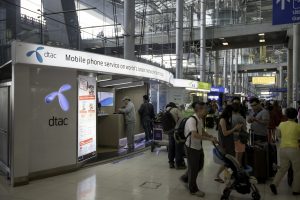Thailand’s telecom market, with an estimated 91 million mobile customers, has for several years been a three-horse race. The industry leader is AIS, which has 46 percent of the mobile market and posts consistently strong earnings. In 2020 AIS reported 85.6 billion baht in net cash flow from operations and paid investors 20.2 billion baht in dividends. Its two main competitors are True and Dtac, which have about 33.7 percent and 20.8 percent of the mobile market respectively.
As reported by Reuters, last week True and Dtac announced an $8.6 billion plan to merge. If approved by regulators, the new company would become the largest Thai telco by market share, accounting for about 54 percent of all mobile users. It would also effectively slim Thailand’s three-horse telco race down to a duopoly.
For True and Dtac, this merger makes a lot of sense as each company has something the other is lacking. Dtac is consistently profitable, paying shareholders a total of 98.4 billion baht in dividends since 2012. But it’s also been shedding market share in recent years, falling from a peak of 28 million mobile subscribers in 2014 to 18.9 million last year.
True has been on an inverse trajectory. It has been adding mobile subscribers at a good clip (perhaps at Dtac’s expense), growing from 19.1 million in 2014 to 30.6 million in 2020. It also has more diverse revenue sources, with a broadband and TV subscriber base, and a large network of physical infrastructure including cell towers and fiber optic systems throughout Thailand.
However, True has struggled with its margins, posting a 2020 pre-tax profit of just 944.3 million baht on 138.2 billion in revenue. Part of this is because it has been forced to spend big to ensure it can remain competitive as Thailand transitions to 5G. From 2012 to 2020, True spent a total of 293.4 billion baht investing in fixed assets such as physical network infrastructure.
In that same time period it spent another 125.3 billion baht on intangible assets, including the costly spectrum licenses periodically auctioned off by the government. These big capital outlays are a necessary cost of doing business for modern telecom giants, but they can add up and weigh down a balance sheet over time.
It is this capital-intensive nature of the business that makes consolidation between rivals attractive in the first place. With this merger, Dtac can piggyback on True’s existing investment in physical infrastructure, and they can pool their spectrum licenses and rights of use while grabbing a commanding share of the market. From that perspective, a merger makes a lot of sense. But will Thai regulators see it that way?
The first potential stumbling block is going to be the role of foreign ownership. Some 42.6 percent of Dtac shares are directly held by Telenor, a Norwegian telecom majority owned by the state. Telenor’s full exposure in Dtac is around 65 percent. True’s largest shareholder is Thai billionaire Dhanin Chearavanont and his corporate group, but China Mobile (a leading Chinese state-owned telecom) holds an 18 percent stake.
We don’t know what the ownership structure will look like once the dust settles from the merger. But Thai regulators are surely going to look long and hard at the idea of a new telco with over 50 percent of the market and substantial European and Chinese ownership. These kinds of foreign ownership structures are common (Singapore’s Singtel has a major stake in AIS) and can be useful for transmitting technology and skills in high-tech industries like telecommunications. But given the new entity’s sheer market power the role of these foreign companies is going to come under some scrutiny.
The other area regulators will want to look at is on the consumer side. This merger, if approved, will leave Thai consumers with only two real options when it comes to mobile operators: AIS or Dtac/True. Is that a good or bad thing? The telcos will argue that by pooling their resources they can become more efficient and leverage economies of scale to deliver a wider array of services at lower prices. Consumer advocates will argue that such a duopoly concentrates too much market power in the hands of too few firms, giving consumers little choice if they are unhappy with the service or the prices. Who is right and which side will Thai regulators come down on? We will have to wait and see in the coming months, but clearly there is a lot hanging in the balance.
































